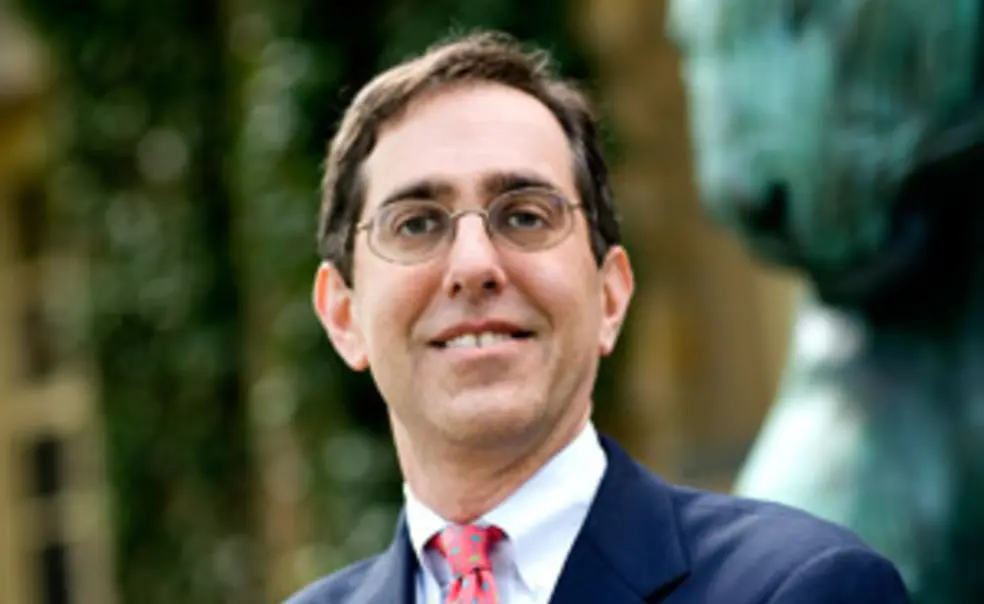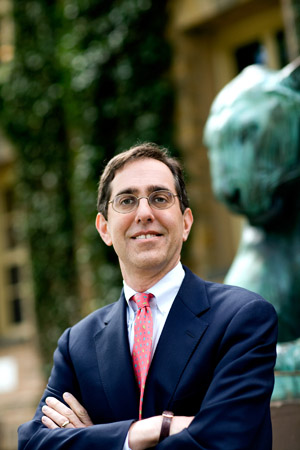A legal scholar, Princeton Provost and President-elect Christopher Eisgruber ’83 has commented on various public issues during his time in academia. PAW writer Allie Weiss ’13 compiled excerpts of his writings and published comments from the past 15 years on topics including gun control, the rights of terrorists, religious freedom, and the Supreme Court appointment process.
Gun control: Referring to a statement in 1997 by actor and NRA advocate Charlton Heston that the Second Amendment was “more essential” than the First Amendment, Eisgruber said the remark reflected a belief that ''people having guns in their homes and having the threat of riots and violence were more central to maintaining American government than the free and independent discussion of ideas…. This is a bleak and unrealistic idea. Sometimes ideas like this are stated by left-wing radicals defending urban riots, and if you're on the outer fringe of society, you might believe that this is your only option. For Charlton Heston to believe this is utterly outrageous.'' (The New York Times, Sept. 12, 1997)
In June 2010, Eisgruber commented on the Supreme Court ruling in McDonald v. Chicago, a victory for gun-rights advocates. The Court ruled that the right to bear arms cannot be violated by state and local governments. He said online at POLITICO: “Will its ultimate impact be modest or broad? Until the conservative justices actually uphold a gun control regulation, we will not know. What we do know is this: it just became much more expensive for states and cities to enact gun control regulations, because, until the Court clarifies the limits of its newly minted doctrine, they will have to fight costly courtroom battles to defend whatever laws they pass.”
Supreme Court appointments: In 2009, Eisgruber challenged President Obama’s emphasis on appointing a Supreme Court justice with “empathy.” Eisgruber argued: “ ‘Empathy’ is just the latest in a string of concepts designed to suggest that we can talk intelligibly about Supreme Court appointments in politically neutral terms. ‘Judicial restraint,’ ‘minimalism,’ ‘character,’ ‘precedent,’ ‘respecting the text’: Like empathy, they matter, but like empathy, they are ultimately Hamlet without the Prince. In the most important cases, justices differ because they have different views about the purpose of judicial review: for example, is the Court's most basic job to protect federalism or to protect minority rights? Until we admit what kind of questions really matter to assessing the career of a Supreme Court justice, our public debates about Supreme Court nominations will continue to be a kind of charade.” (American Constitution Society, May 12, 2009)
A year later, Eisgruber wrote a column lamenting that the President would have “little or no chance” to replace retiring Justice John Paul Stevens with someone who had Stevens’ “kind of quirky independence” – a true judicial maverick. Since Stevens was appointed in 1975, wrote Eisgruber, the justice’s former law clerk, “ideological categories hardened” because of the abortion debate and Roe v. Wade. “The abortion issue came to define the court,” he wrote. “If you know where a justice stands on abortion today, you can deduce, with very few exceptions, his or her positions on federalism, gun control, affirmative action, gay rights, campaign finance, tuition vouchers for religious schools — the list goes on and on. In 1975, that was not so.” (Los Angeles Times, April 20, 2010)
Avoiding religious favoritism: In an online response to a 2012 debate over whether mainstream religious organizations should be exempt from taxes, Eisgruber argued that exemption only works if minority religious groups receive it, too: “If mainstream religions or strong secular interests receive exemptions from general rules, minority faiths are entitled to equivalent exemptions . . . If churches but no other charities are allowed to build in residential neighborhoods, if religious employers enjoy unique, blanket immunity from discrimination laws, or if sales of religious publications are singled out as tax-exempt, then the law is showing unjust favoritism.” (The New York Times, May 9, 2012)
Protecting religious liberty: To avoid religious favoritism, Eisgruber argued in a law journal that society has to re-analyze how it defines religion in the first place. “In order to protect religious liberty we have to define what religion is, and once we are in the business of saying that some beliefs, commitments, and projects are entitled to special treatment as ‘religious’ while others are not, we are creating a sphere of orthodoxy of exactly the sort that any plausible understanding of religious liberty should deplore” (“Does It Matter What Religion Is?” Notre Dame Law Review, Jan. 2009)
Terrorists’ rights: In a Princeton talk following President Bush’s Executive Order in 2001 that allowed people accused of terrorism to be tried by military tribunals instead of by civilian courts, Eisgruber argued for terrorists’ constitutional rights. “Although terrorists are undoubtedly horrible people who commit horrible acts, [constitutional rights] are not normally reserved for nice people,” he said, “This is a matter of giving due respect to principles of liberty and to principles underlying our constitution.” (“What Rights do Terrorists Have?” Lecture at Princeton University, Feb. 20, 2002)
The federal government’s power to set a minimum wage: Eisgruber was part of POLITICO’s “The Arena” discussion about the minimum wage in 2010. He was responding to a comment by Republican Senate nominee Joe Miller that there should be no federal minimum wage because it is “not within the scope of the powers that are given to the federal government.” Eisgruber disagreed: “Joe Miller must think he’s living in 1923. That was when the Supreme Court held a congressionally passed minimum-wage law unconstitutional. The Court reversed that decision in 1937, and the constitutionality of the minimum wage has been settled law ever since. … Not even the Roberts Court, conservative though it may be, would take his position seriously – the minimum wage clearly pertains to interstate commerce, and the federal government has power to regulate it.”
Elections: In the Fordham Law Review, Eisgruber explained that elections do not constitute democracy. “Periodic elections provide indispensable representations of the people,” he wrote. “Elections, however, bear only a pragmatic connection to democracy, not a constitutive one. Elections are desirable institutions only insofar as they serve democratic goals . . .The problem is that ‘voter,’ like ‘juror’ or ‘legislator,’ is a specific political office embedded in a network of political institutions. Like all such offices, it carries with it specific incentives.” (“Dimensions of Democracy,” Fordham Law Review, April 2003)













No responses yet